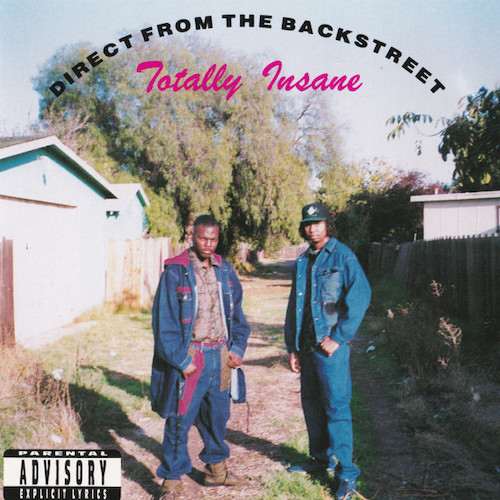“I don’t make nobody listen to my lyrics G
You don’t like ’em? Too bad — you ain’t payin me
I get my mail on by dissin hoes or pushin junk
It don’t matter I’ma still stay fat punk!
You try to keep me down by lockin me up in the jail
I sit up in the cell, still make my fuckin mail!”
Every now and then I sit back and contemplate why I still do this after 25+ years. What is there to write about that I haven’t already? Then an album like Totally Insane’s “Direct From the Backstreet” comes along to remind me why. We take for granted today that nearly everything we could possibly want is on the internet, but a huge part of rap music’s history happened before the world wide web went mainstream in 1993. Even then the earliest websites didn’t focus on reviewing rap music, and text based newsletters were a blip on the radar compared to magazines like The Source. As a result there’s a not insignificant chance that if somebody doesn’t write about the history at some point, even decades after the fact, the record of artists, albums and events back then could be lost forever.
Someone may prove me wrong later on but I looked around and didn’t see another review of “Direct From the Backstreet” online — just a couple of token entries on Discogs and Wikipedia. The latter doesn’t even list any print reviews for the East Palo Alto rap group, although I have to think someone put it in print in Cali and it just hasn’t been documented. Again this is where the knowledge vacuum exists — pre-1993 rap albums. Totally Insane’s debut came out April 16, 1992 on In-a-Minute Records, a one time indie powerhouse in Oakland featuring the likes of Dre Dog, Rappin’ 4-Tay, RBL Posse and Pooh-Man. Even fledgling rap entrepreneur Master P got his start thanks to In-a-Minute. The label dissolved in 2000 but if you were a fan of West coast rap in the 90’s you probably knew their name.
I had to qualify that with “probably” because although In-a-Minute looms large in my own mind, they never had a single album that went gold or platinum. In fact Dre Dog (who later changed his name to Andre Nickatina) was the only artist I know of who got one album onto two Billboard charts at the same time. This makes them incredibly small potatoes compared to imprints like Def Jam, Ruthless, Loud, Priority, Death Row, and so on. On the other hand for an indie label out of Oakland who did the damn thang on their own with no help, any degree of mainstream success is mega large. Back to this album though — when I think of rappers back in the day that sampled Barry White’s “Playing Your Game, Baby” both Black Moon and Totally Insane spring to mind.
Da Beatminerz loop may have been a little less scratchy, but the crackling of the needle on the grooves gives “I Can’t Be Faded” a charm all its own. The album was largely produced by TC, with assistance from the group’s two rap stars, Ad Kapone and Mac-10 (not that one). In fact familiar beats and breaks abound on this album to a degree that might surprise new listeners. You may just catch yourself saying “I love it when you call me Big Poppa” when “I Don’t Even Trip” gets to the first break, although TC turned off the Isley Brothers and threw in a sample of Oakland legend Too $hort instead.
It’s not strictly about the sample though. There’s a very no-nonsense style of delivery by Mac-10 and in particular Ad Kapone on these tracks. You could accuse them of being monotone, but only if you’d say the same about the late great Keith Elam. As a listener I think it speaks to their determination to succeed, and it’s not as though they commit the sins of running of of breath or stumbling over their words. In fact on tracks like “No More Mr. Nice Guy” it’s clear that even with an uptempo loop, they can spit just as fast as needed and still stay suave. The song is a personal favorite complete with the humorous breaks between verses, which are more interesting than the skits between tracks on tons of other albums. I also really appreciate the scratched in Ice Cube lines. Cali shows Cali love right back on this album.
It might be overstating it to call “Direct From the Backstreet” an overlooked classic, but don’t think I’m not tempted to simply by the vacuum of coverage surrounding Totally Insane’s debut. In the end I have to temper my enthusiasm slightly and tell you what this album isn’t — it isn’t next level, groundbreaking, or sentiments you wouldn’t hear from any rapper from the same time and place. What it is though is entirely solid in a way that’s hard to duplicate today. Digital distribution has for better or worse lowered the bar to get in the music industry. Bsck in the day you had to compete hard to even get signed by a “big indie” like In-a-Minute. That commitment to hard work is written all over Totally Insane’s album and it’s totally insane that nobody else has talked about it before now.

